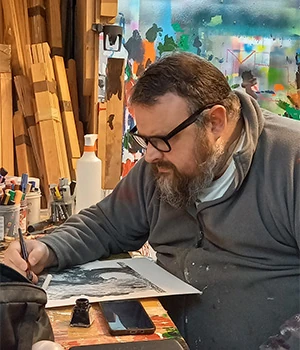
BIO
Jesús Zurita was born in Ceuta (Spain), in 1974. He lives and works in Granada. Advancing amongst the boundaries of landscape and narrative abstraction, Zurita depicts his pictorial universe on canvases and wall installations that both construct and allude to a narrative of strangeness. His compositions’ narrative structures imitate some of the narrative strategies of the comic and graphic novel, altering them so that they babble rather than speak. It is an art of innuendo like ‘nature’, in which masterly virtuosity and mystery reign.
A prolific supporter of drawing, Zurita studied at the Faculty of Fine Arts in Granada. He produces his artworks through simple, precise strokes of ink and brush that are carefully detailed, most of which share the presence of a vegetation tangle that involves the spectator. Influenced by Minimalism, Zurita pays attention to the planes and their bi-dimensional reading. He arranges, in the exhibition space, a subtle scenography made of such planes.
In his style, the organic, even the viscous, meets geometry, thus yielding dreamlike spaces in which he rethinks the value of depiction as staging. Also, he reflects on incorporating both narration and silence into the painterly medium. A nearly-spectral silence that speaks of reverential respect for the depths of the forest, combined with an interest in its biology.
ARTWORK
SHORT DOGMA
It was said and thus perpetuated that, a long time ago, someone sat under a tree and when he got up his name had changed. Some anecdotes meander on this change under those graceful leaves. But what we must not neglect is that a name change is a serious matter. First you are someone and afterwards someone else. A thing first, another after.
For something to burn, it must be taken for granted that two things identical to themselves happen: the wood, which is the wood, will be the ash, which is the ash. However, the flames that emerge between the two do not attend to the identical because the flame is the flames and they are different from each other, proclaiming the truth of the difference. In addition, they have their own saying, which is the crackle, and they impose their legitimacy, which is the deflagration, thus revealing that fire calls us by using only names and does so with such intensity that it constitutes the mandate of all things scattered on the face of the world.
It is concluded that it is by a name that is granted to us knowing ourselves because what is different allows the things themselves to happen. Fire always says and only says names and this is a necessary dogma so that something can be known. Finally, and by fiery whim, every name must be shorter than what it names.
Don’t forget it.
Jesús Zurita


